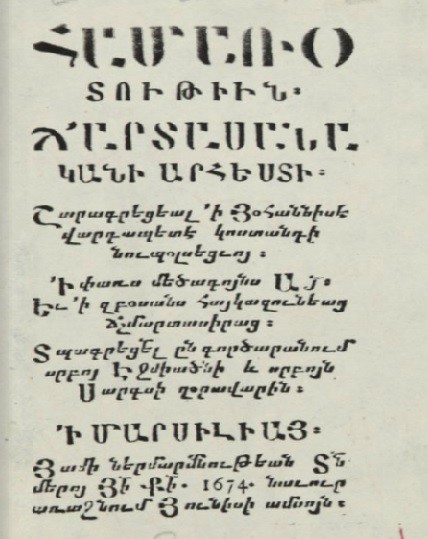Title page of Hovhannes Holov’s “Summary of Rhetorical Art” (1674)
Hovhannes Holov, an Armenian Catholic priest who lived in the seventeenth century, had an important role in Armenian early modern literature, especially in the early history of Modern Armenian.
His actual name was Hagop, and was born on March 26, 1635, in Constantinople. He studied in the Catholic colleges of Rome and Lyon (France) between 1660 and 1667. Afterwards, he devoted himself to scholarly endeavors and to work as translator and preacher. He contributed to the propagation of Catholicism among Armenians. He was the first censor appointed to oversee Voskan Yerevantsi’s printing house in Amsterdam—where the first Armenian Bible was published—and protected the interests of Armenian printers, which cost him his job.
He was the author and translator of about fifteen works. His first printed work was the Armenian translation of “Spiritual Orchard” (1670). He later published a Latin grammar of the Armenian language (1674), for which he earned the name “Holov.” Its subject was the grammar of Classical Armenian. In the introduction, Hovhannes Holov noted the existence of three variants of Armenian: “Armenian” (Classical Armenian), “secular” (dialects), and “civil” (a mix of “Armenian” and “secular,” utilized by public speakers and attorneys). Re grammar, the author defined its limits, studied the different elements of sentences, as well as syntax, punctuation, phonetics, metrics, and other issues.
Holov also published “Summary of Rhetorical Art” in 1674. Here, he established the grounds for Armenian modern stylistics and rhetorics. One of his final works, “Explanation of the Psalms Inspired by the Holy Spirit” (1687), took Modern Arnenian to a new level. The author was the first to make a defense and apology of Modern Armenian as a means of expression, long before its advancement as literary language in the nineteenth century.
Hovhannes Holov passed away in Venice on November 24, 1691.

